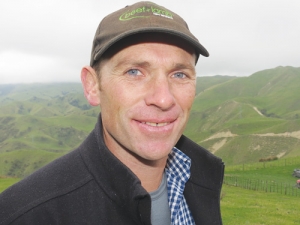The existing board structure of Beef + Lamb NZ (BLNZ) works well and perceived conflicts of interest over processor-nominated directors is not an issue, claims chairman James Parsons.
However, he says the current BLNZ consultation on its constitution is a chance to have a really good discussion with farmers.
The board isn't "precious" about it, he insists.
"This is a farmer organisation and it has to be a constitution farmers feel real ownership over. We are having an open discussion about it," Parsons told Rural News after a farmer consultation meeting in Waikato last week.
"So far, when I do a bit of a straw poll – and it is very early days – the majority of people who put up their hand are supporting the status quo. But there are a lot of people sitting in the middle undecided; they will need more information.
"If there is a strong appetite for change, we would have to shape that up into a proposal to change our constitution, which would be up for voting in March at our annual meeting. That requires a 75% majority vote. Unless there is a strong appetite for change we are not going to put up a proposal that gets voted down. There's no point in going there."
Parsons sees opportunity to have "a really good discussion with farmers and see what their views are".
The current BLNZ governance structure operates under its constitution voted in by farmers in 2003 when it was called Meat and Wool NZ. This provides for a board of nine. It has six farmer-elect directors – split up by the six electoral wards – and two processor nominated directors nominated by the Meat Industry Association.
There is provision for a ninth director, an independent selected for skills, but that slot has never been filled.
"There has been feedback from some groups in the farming community saying they don't believe it is in the best interests of BLNZ to have processor-nominated directors on the board. They think there are conflicts of interest," Parsons adds.
"We are genuinely consulting on whether farmers support or want a change or whether that's just the loud minority view.
"We are not required to accept that nomination from the Meat Industry Association; they don't appoint someone to that board, they just nominate someone and it's entirely up to the discretion of the BLNZ board whether we want that individual or we go back and say 'thanks very much for your nomination but we'd like someone different'."
The options are to maintain the current structure or, if there is enough appetite for change, move to a structure where the two processor-nominated directors are replaced with two independents. Parsons says they would be chosen on a skills basis.
"Another option – I wouldn't support this one or recommend it to farmers, but we are keen to hear farmers' views -- is that we should go down to a board of six farmer directors and seek to fill that independent director slot with someone on a skills basis.
"Those [changes] would all need a change to our constitution."
Parsons believes the current structure is working well.
"Perceived conflicts of interest I don't think are in any way an issue in terms of how we govern an organisation," he says.
"Those processor-nominated directors are not appointed and they are not representing the processors. They are there to give a processor sector view... but they are responsible to govern the organisation in the best interest of farmers, not processors. That's quite clear under the Companies Act.
"We think the current system works well and I think there's a need for the sector to pull together more, rather than get polarised in our different camps."











